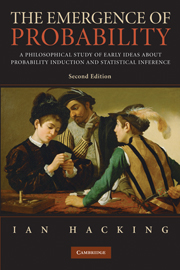 The Emergence of Probability
The Emergence of Probability It may seem as if mathematical expectation should have been easier to grasp than probability. From an aleatory point of view the expectation is just the average pay-off in a long run of similar gambles. We can actually ‘see’ the profits or losses of a persistent gamble. We naturally translate the total into average gain and thereby ‘observe’ the expectation even more readily than the probability. However the very concept of averaging is a new one and before 1650 most people could not observe an average because they did not take averages. Certainly a gambler could notice that one strategy is in Galileo's words ‘more advantageous’ than another but there is a gap between this and the quantitative knowledge of mathematical expectation.
Cardano's notion of ‘equality’ and ‘the circuit’ in games of dice is some anticipation of mathematical expectation but it is difficult to follow in detail. Not until the correspondence between Fermat and Pascal do we find expectation well understood. This concept is at the very heart of Pascal's wager. Recall, however, that the Port Royal Logic thinks it important to ‘reorient’ people so that they base decisions on both utility and probability. This suggests that a comprehension of expectation was not something one could take for granted even in 1662. Yet shortly before there had been a really thorough statement of concepts akin to expectation. They are well worth scrutiny. I refer to the first printed textbook of probability, Christian Huygens 1657 Calculating in Games of Chance.
To save this book to your Kindle, first ensure no-reply@cambridge.org is added to your Approved Personal Document E-mail List under your Personal Document Settings on the Manage Your Content and Devices page of your Amazon account. Then enter the ‘name’ part of your Kindle email address below. Find out more about saving to your Kindle.
Note you can select to save to either the @free.kindle.com or @kindle.com variations. ‘@free.kindle.com’ emails are free but can only be saved to your device when it is connected to wi-fi. ‘@kindle.com’ emails can be delivered even when you are not connected to wi-fi, but note that service fees apply.
Find out more about the Kindle Personal Document Service.
To save content items to your account, please confirm that you agree to abide by our usage policies. If this is the first time you use this feature, you will be asked to authorise Cambridge Core to connect with your account. Find out more about saving content to Dropbox.
To save content items to your account, please confirm that you agree to abide by our usage policies. If this is the first time you use this feature, you will be asked to authorise Cambridge Core to connect with your account. Find out more about saving content to Google Drive.